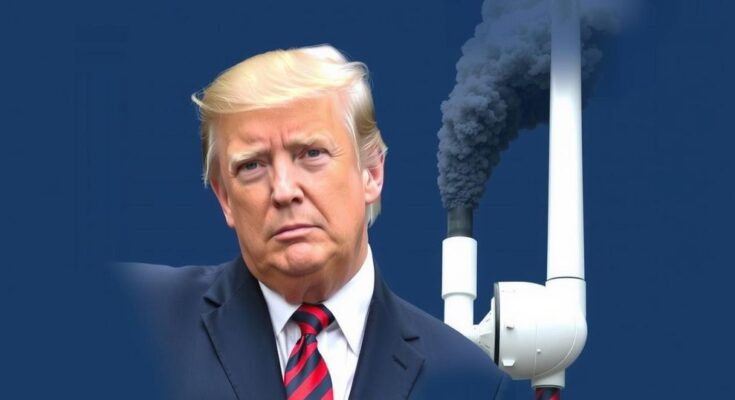President-elect Donald Trump plans to declare a national energy emergency to reverse the Biden administration’s energy policies, arguing that current climate regulations are harmful to the economy. The focus is on avoiding Europe’s mistakes, as high energy prices and job losses emerge from stringent regulations. Trump aims to restore economic factors while promoting energy independence from China and alleviating financial burdens on Americans.
On his first day in office, President-elect Donald Trump has pledged to declare a national energy emergency. This decisiveness entails rolling back President Joe Biden’s energy restrictions, dismantling the electric vehicle mandate, rescinding incentives for renewable energy, and lifting the ban on natural gas exports. Trump’s approach is touted as a critical response to the current energy crisis caused by the previous administration’s policies, which many believe have severely injured the American economy and disadvantaged its citizens.
The dire consequences of climate change regulations are manifesting notably in Europe, where economic repercussions have led to a significant decline in industrial productivity. For example, the German manufacturing sector anticipates a 3% decrease in production for 2024, marking its third consecutive year of decline. Given these circumstances, it is crucial for the United States to avoid mirroring Europe’s misguided energy and climate policies.
Job losses in the German automotive industry are attributable to both the imposition of stringent climate regulations and the influx of low-cost Chinese electric vehicle imports. To mitigate potential repercussions from global market dynamics, it is essential for the U.S. to reassess its climate policies, transitioning towards more realistic measures that prioritize economic independence from China without compromising American job security. Furthermore, the Biden administration’s climate directives have exacerbated inflation by escalating electricity and transportation costs, adversely affecting low-income individuals and small enterprises.
The regulations imposed by the Environmental Protection Agency (EPA) demand that by 2032, 70% of vehicles sold must be either battery-powered or plug-in hybrids. This drastic shift is likely to elevate the purchase price of vehicles considerably. For instance, an electric Chevy Silverado is priced at $96,000, whereas its gasoline counterpart is $42,300. Moreover, states like California impose additional regulatory burdens, mandating that all new vehicles sold by 2035 fall within these specific categories. Trump’s administration may potentially annul California’s regulatory waiver, thus restoring a more balanced approach to vehicle standards nationwide.
The rising residential electricity prices, which have increased by 32% since January 2021, are a direct consequence of the enforced reliance on renewable energy. This leads to complexities in energy production and grid integration, driving costs higher. Data indicates that states prioritizing renewable energy experience inflated electricity rates compared to those that do not, underscoring the adverse economic impact of such policies.
Trump’s proposed energy emergency responds effectively to Biden’s problematic climate strategies, which have contributed to economic sufferings such as increased car prices, higher electricity rates, and potential job losses to foreign markets. The urgency demonstrated by Trump to rectify these challenges aligns with the necessity of safeguarding American livelihoods during what is classified as a national energy emergency.
The current energy landscape in the United States reflects the tension between climate change initiatives and economic stability. Under President Biden, various regulations have been enacted aimed at environmental protection, most notably promoting renewable energy sources and mandating shifts in vehicle sales. However, these measures have sparked significant debate regarding their economic implications, particularly in light of rising energy costs and international competitive pressures, especially from China.
In conclusion, President-elect Donald Trump’s proposed national energy emergency seeks to counteract the adverse effects of the current administration’s energy policies. By eliminating restrictive regulations and emphasizing traditional energy production, Trump aims to restore economic stability and promote job retention within the American workforce. It remains pivotal for future energy policies to find a balance that addresses climate concerns without sacrificing economic well-being.
Original Source: www.heritage.org




